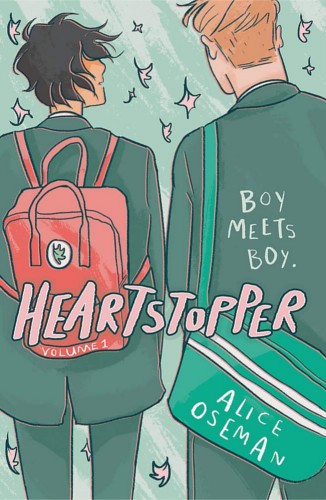Hippo finished reading Heartstopper, Volume 1 by Alice Oseman

Heartstopper, Volume 1 by Alice Oseman
Boy meets boy. Boys become friends. Boys fall in love.
Charlie and Nick are at the same school, but they've …
This link opens in a pop-up window

Boy meets boy. Boys become friends. Boys fall in love.
Charlie and Nick are at the same school, but they've …
This was recommended by @akil@snipetteville.in on the Editors' Bookshelf of #Snipette, and then I found it in the library, so of course I had to borrow it!
@DerekCaelin@bookwyrm.social I've been wanting to read this since I don't know how long! How was it?
Recommended by @rhea@snipetteville.in and I don't know if I can stomach it given the state of that part of the world right now but I do want to read it someday! If my eyes fall on it at a bookshop somewhere, I'll take that as a sign 😜
I actually wanted to read The Priory of the Orange tree, but that's a bit bulky to carry around, so I picked this one up from the library instead. Wow, it's so fast-paced! A good way to get back into the ready cycle. I'm impressed that Samantha Shannon came up with this in her first novel, no less!
One of the few books of which I started watching the show first and only got onto the book later :P
(Unfortunately it's on my ereader at home, so I got to wait until I get back to finish it...unless I can pick up a hard copy of course!)
Okay, so this started from an old Guardian article that I remembered saying our future is not going to be like how George Orwell imagined it, but more like how Neil Postman did.
This is not the book the article was talking about, but it is a book (co)authored by him that my father said we have in the house, so I ended up reading it! Even though it's pretty old it's a commentary on the education system that's (unfortunately) still relevant even today!
Did I say the second book in this series was good, better than the first? Well his one is even better! In fact, it ties all three stories together in a way that I never imagined! It's also a bit darker and more nuanced than the first two—all in a good way. Thanks @rhea@snipetteville.in for introducing me to this series!!
No connection to A Good Girl's Guide to Murder haha, although I read them at similar times. I heard about this book from somewhere (forgot where exactly). It's a good guide, although a bit dated; it was set in more innocent times when people still used Facebook and the browser monopoly of Chrome was yet to get into full swing. I hope someone comes up (or has already come up) with a modern-day version of this guide, since it's more necessary than ever now—especially since we have a lot of people online these days who have no clue about how to protect themselves, or why they should, and only half a clue about how their devices even work...
I read this after a longish gap from the first book, and tbh I was a bit sceptical about how good a sequel would be since the original case was already closed in the first book, so this could end up being more contrived...but it wasn't! I'd say it was better than the first book—more nuances and shades of grey, and Pip (the protagonists) herself also matures as she realises/sees that. There were also many common characters and refs to the first book so it wasn't disconnected at all!